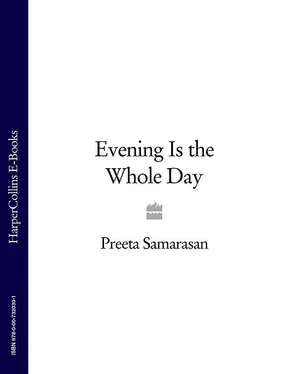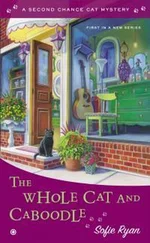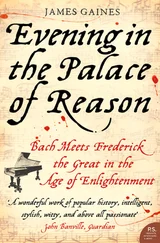“So!” he said aloud to the fellow, looking at him from head to toe and back. He was all spiffed up, this chap, decked out in a spotless white shirt and a bow tie just to come and sign an agreement in the back room of the miners’ club. “Got yourself a deal, eh?”
“Yes, yes,” said Tata. “Thank you very much, and good luck on your return to Scotland, Mr. McDougall.” He held out his hand, and Mr. McDougall took it with distaste, unable to shake the feeling that the fellow was having the last laugh.
He was right, of course, that Tata was pleased with himself for one-upping a vellakaran, for making off so effortlessly with such a bargain. “This,” he said, holding the deed out to Paati where she stood peeling onions for the day’s chicken perital, “this is the beginning of a new age. For us and for Malaya.”
Paati, her hair still black, her hands still soft, nodded uncertainly. “Maybe,” she said, “maybe so. But when the British are really gone for good, we’ll miss them.” And under cover of her onion-peeling, real tears, earnest and round, ran down her face. She wept for the Englishmen who would be booted out unceremoniously for the supposed sins of their fathers, sins she had never known, for she had known nothing but a glorious, sturdy contentment in her childhood. She wept for old times, for her missionary schoolmistresses and her red-bound Royal Readers, for “God Save the Queen” and the King’s Christmas Message on the radio. She wept for old, lazy-eyed Mr. Maxwell, the overseer at the Cowan & Maugham Steamship Company; for Mr. Scotts-Hornby, the late manager whose position Tata had filled; for Lieutenant Colonel Phillips and his wife, who had rented the bungalow behind the house to which Tata had brought her when they were newly married. And she wept for one Englishman in particular, whose name she did not speak, even to herself.
“ Tsk ,” said Tata now. “How many times have I told you to peel the onions under water and wear your glasses while doing it? Aadiyappa, how you women let vanity rule your lives!”
Obediently Paati dropped each onion with a plop into a large ever-silver bowl of water, and no more was said of the British on that day.
BY THE TIME Mr. McDougall packed away his coconut-frond fans and his tropical-weather Wellingtons for good, Ipoh, never the cultural hub of British Malaya, had begun to split her thin colonial skin, and a new town peered out from under it, its pavements wet with phlegmy spittle. Bustling kopitiams sprouted around derelict whiskey bars like toadstools around rotting logs. Inside them flocks of old Chinamen squatted at marble-topped tables, dipping fluffy white bread in their morning coffee, slurping their midday bak kut teh. The Cold Storage, with its gleaming, chrome-stooled milk bar, closed forever on a quiet Saturday afternoon. In its place arose an establishment shifting uneasily between supermarket and wet market, alive with flies, slick with the sanguine juices of fish and fowl. The University Bookstore folded, and all over town, small, disreputable-looking bookstalls, with Chinese names and Indian film magazines strung across dark doorways, popped up. The raucous revelry of Chinese businessmen and Indian doctors expelled the last ghosts of Englishmen’s subdued scotch-and-cigar evenings from the richly paneled rooms of the Ipoh Club.
Having selected an auspicious moving day from their Tamil calendar, Tata and Paati packed up their house in Butterworth and drove to Ipoh with her rosewood trunk on the back seat and his wiry old bicycle strapped to the roof of their maroon Bentley. Tata’s pleated khaki trousers bulged with assets and liabilities: a hefty balance at Lloyd’s Bank, various and sundry investments in the industries of the inchoate nation (so that when he died the obituary writer at the Straits Times fanned out for his readers the entire pack of catchy double-barreled monikers Tata had amassed: Rubber Baron, Cement King, Duke of Durians, Tapioca Tycoon, Import-Export Godfather), a wife still fresh and dimpled at fifty-eight, and three unmarried daughters. His two sons were away: Raju had got a job with a law firm in Singapore after coming down from Oxford, and Balu, newly married, was winning ballroom-dancing competitions all over Europe.
“Useless bloody fool,” Appa was to growl years later, pointing out Uncle Ballroom to Uma and Suresh and Aasha in old family albums with moldering construction-paper pages. And, jabbing with an index finger the pictures of Uncle Ballroom’s doomed garden-party wedding: “Tangoing and foxtrotting his way to penury. Foxtrotting only he found his fox. Too bad she could trot faster than him. He was chachaing this side, she was choo-chooing that side. Bloody idiot got outfoxed by his own fox. Hah!” “And probably eating steek,” Suresh would whisper to Aasha when they were out of earshot, “with a knife and fork. And sleeping with no shirt on. Like J. R. Ewing only.”
But in 1956, Tata was untroubled by visions of his profligate son’s future. As the country charged towards birth and impetuous youth, he embraced his twilight years with a grateful sigh and a settling-in sense. Hiring servants only to cook and clean, he busied himself with his rose bushes and his vegetable garden. He harvested ripe chilies and twined tender tomato plants around stakes. He pruned, he weeded, he mowed twice a week. He planted trees: guava, mango, tamarind. He put up garden walls and trellises and came in for tea at ten past four, sweating but radiant, smiling around his kitchen at the rightness, the in-placeness of it all.
In a shed hastily erected in the garden, he spread mail-order instructions out on a workbench and built and varnished strange pieces of furniture he had previously only read about in books: secretaries, hall trees, cane stands.
He ordered a chandelier from France and, when it arrived, spent six days sitting in front of the opened crate, turning each part around and around in his hands. On the seventh day, a sudden fire roaring in his belly, he stayed up well past his usual bedtime to assemble the chandelier by the light of a kerosene lamp, frowning and muttering at the poorly translated directions, struggling, struggling, lipchewing, jawgrinding, squinting at the diagrams, until finally, at one minute to midnight, he dragged Paati from her bed in breathless triumph. They raised their faces towards the hanging chandelier in numinous expectation. Tata put the index finger of his right hand to the switch, took a deep breath, and flicked it on. At exactly midnight on the thirty-first of August 1957, there was Light …
… at precisely the same moment as, two hundred hopeful miles away, Tunku Abdul Rahman raised his right arm high on a colonial cricket ground and saluted the country’s new freedom to the accompaniment of an aroused-and-rousing cheer of “Merdeka!” —Freed om! —and the eager choreography of the flag boys: in perfect synchrony, the Union Jack was lowered and the new flag raised. There, too, was Light. The blazing Light of a dozen fluorescent streetlamps, the crackling Light of a hundred flashing cameras, the (metaphorical, now, but no less real) inner Light of pride and ambition that shone in a million patriotic breasts just as it had shone in other breasts at other midnights.
Convinced that the Big House should grow and glow and celebrate sympathetically, Tata consulted a firm of architects about several extensions. An extra guest room. Two extra bathrooms (one with a clawfoot bathtub). An orchid conservatory. A music room–cum–smoking room (although there was but one gramophone, and no one smoked). An English kitchen equipped with a gleaming Aga range, in which the cook refused to set foot, preferring her outdoor Indian kitchen with its squealing tap and its gaping drains ready to receive fish guts, vegetable peelings, and leftover curries. And finally a servant’s room under the back staircase, although neither Tata nor Paati got around to hiring a live-in servant to occupy it. Paying no heed to Mr. McDougall’s conservative taste, Tata had the new wings built in a proud local style: solid wooden slats on a concrete base, patched willy-nilly onto the austere symmetry of the original grey stone structure, so that in less than two years the house metamorphosed into something out of an Enid Blyton bedtime story. Unnecessary corridors met each other at oblique angles. Additions, partitions, and covered porches seemed to rise out of nowhere before the eye. Green mosquito netting thumbed its nose at the Battenburg lace curtains in the next room. Sweat and steam and coal smoke from the hot Indian kitchen invaded the immaculate English kitchen and smeared its shiny surfaces. And above it all, the house’s bold features—the quick, damning eyelids of the shutters, the sharp gable noses so different from the flat roofs around them—shuddered with a Scotsman’s thin-lipped rancor. These bloody Nati’es. That’s whit ye gie when ye gie a boorichie ay wogs ’eh reit tae rule .
Читать дальше












